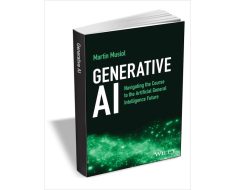
At the SAP TechEd in 2023 event in Bangalore, India, SAP announced a comprehensive series of generative AI capabilities and advancements aimed at empowering developers of all skill levels to supercharge their businesses in the age of AI.
As organizations aim to derive business value from generative AI, effective collaboration between professional and citizen developers is essential. SAP has launched SAP Build Code solutions, which streamline cooperation with business experts who use the low-code SAP Build solutions introduced at SAP TechEd in 2022. Uniquely built for SAP applications and the SAP ecosystem, SAP Build Code solutions offer AI-powered productivity tools for developers optimized for Java and JavaScript development. SAP Build Code also draws on the power of SAP’s new generative AI copilot Joule – the copilot that understands business – to further boost productivity, embedding code generation capabilities for data model, application logic and test script creation.
“We are not trying to build a large language model because a lot of people have built large language models already. We want to build a business model that speaks business language, which means outputting charts, tables, and information businesses use. It is unique because there is no such a model in the market today. SAP is uniquely positioned to build that model because we have business data and know-how. The good news is that we can leverage all the learnings from language models to our business model. You can use the business model to get business results and pass it to language model to create a human-readable response as well,” said Walter Sun, SVP and global AI head of SAP Singapore, during a media briefing.
“We want to make life easier for businesses and help them get more done less time. For example, if you enter Joule, you can go anywhere in our SAP ecosystem. In addition, SAP has a generative AI hub that enables embedding of AI into products. Developers in companies may want to customize solutions according to business needs. Developers can use large language models through business technology platform to build connectors and custom solutions with themselves that connect to the rest of the SAP ecosystem. We want to get our customers to the right destination with the right language model without having them needing to pick or choose. Our vision is to be a market leader in leveraging generative AI for business customers,” Sun added.
Good data is the foundation of good AI. SAP HANA Cloud continues to pioneer innovation in the data space by adding new vector database features to its multimodel offerings at no additional cost. Vector data stores manage unstructured data – such as text, images or audio – to provide long-term memory and better context to AI models. Data management makes it easy to find and retrieve similar objects quickly. For example, users can search for suppliers based on the language in their contracts to examine payment history and trace individual orders. These powerful new vector database features enhance interactions between large language models and an organization’s mission-critical data. The innovation helps put SAP developers at the forefront of delivering radically new levels of data insight within a secure, private framework that uses industry-specific customer data to reduce hallucinations.
AI Foundation, a new one-stop-shop for developers to create AI- and generative AI-powered extensions and applications on SAP BTP, will further help increase developers’ impact and efficiency. AI Foundation includes everything developers need to create business-ready AI tools on SAP BTP – from ready-to-use AI services and access to the top large language models to vector database capabilities and AI runtime and lifecycle management.
The rapid pace of technological innovation has driven global demand for skilled developers – and SAP is increasing its learning opportunities in tandem. As part of a commitment to upskill two million professionals by 2025 and complement free AI learning content already available, SAP has launched new role-based certification and free learning resources for back-end developers using the ABAP Cloud development model. The two new learning resources covering ABAP development tools on SAP BTP and SAP S/4HANA are available on the SAP Learning site. They are designed for agile and cloud-compliant business transformation, providing developers with skills to build cloud-ready extensions aligned with SAP’s clean core strategy.
Manik Saha, managing director of SAP Labs Singapore, provided a more local glimpse of how the company empowers AI professionals: “The AI competency hub in Singapore is a competency hub for Southeast Asia. We have hired and onboarded 50 AI engineers in Singapore. I am super happy with the quality of talent and the talent pool we are getting from the local universities. In addition, we have candidates from across Southeast Asia who joined us. SAP is in the position to build all these capabilities. We have also found that we are going through a bit of a generational shift, maybe two to three years ago, and here we are today. This resource pool is primed to get into that capability perspective. It is the right time to invest in AI, especially now that the Singapore government focuses on efficiency and productivity as key mechanisms. We feel that what we bring to the market is really going to accelerate that ambition.”
Eileen Chua, managing director of SAP Singapore, elaborated further on the government’s role in the driving AI initiatives in Singapore: “Many of you might be familiar with Singapore’s smart nation initiative, wherein the vision is to not just look at prioritizing technology adoption but the actual implementation of ICT technologies and innovations to look at transforming industries to help our large enterprises and SMEs. Our journey is not new when it comes to AI. The national AI program of Singapore launched in 2017 to bridge the gap between what we were doing with the institutes of higher learning and the startup ecosystem. To further support some of the initiatives under smart nation, the Monetary Authority of Singapore has been very generous in offering grants to do co-financing programs and drive the adoption of AI, particularly in the financial services sector, with the aim to improve operational efficiency and stimulate innovation among our companies.”
“The Singapore government strongly supports AI and has invested heavily in research and development. The government also supports SMEs and large enterprises from different industries through various grants in Singapore. We see some of the use cases pervasive with AI. Many financial institutions look at using AI to automate back-office functions, especially in fraud detection. We also see an increased use of AI in the healthcare sector, particularly in improving diagnosis and treatment. We are working very closely with one of our partners, Synapse, one of our largest IT solutions providers for public health, to explore how we can look at AI to improve the diagnosis and treatment of some of the critical illnesses in Singapore,” Chua added.
In addition, SAP has joined the Stanford HAI (Institute for Human-Centered AI) Corporate Affiliate Program. Researchers and engineers at SAP will work with the Stanford academic community, including research faculty and students, on the intersection of generative AI and business.



